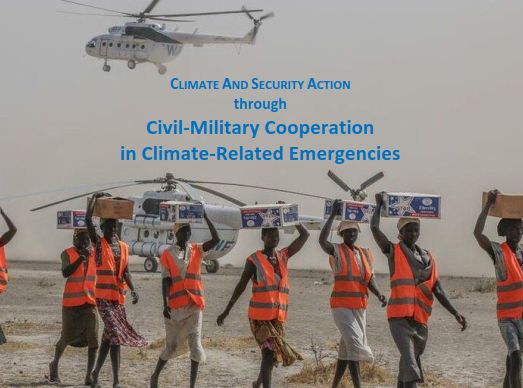GMACCC launches a new project on "Civil-Military Cooperation in Climate-Related Emergencies"

Brussels, 15 June 2023 - Together with our partners, GMACCC has launched a new project on “Civil-Military Cooperation in Climate-Related Emergencies”.
Project CASA (Climate and Security Action) will assess the extent to which national militaries especially in EU and NATO countries have the necessary financial resources, experts, training, equipment, and facilities to effectively prepare for and respond to the increased occurrence of climate-related emergencies.
It will do so through an interdisciplinary network of experts who will collect, analyze and publish data on military activities and civil-military cooperation. The aim to provide actionable data for decision makers, stakeholders and the wider public of how these military forces can best work together with civilian emergency management agencies within countries and across international borders.
The Climate and Security Context
Natural disasters pose dire threats to individuals and communities, often straining state capacity and forcing states to redirect resources to humanitarian response. In fragile contexts, disasters can strain social and political systems to the breaking point, increasing the risk of conflict or humanitarian crises. At the same time, readiness for and response to such emergencies can enhance cooperation and promote peace within and between countries. Preparing for and responding to climate-related emergencies are thus important aspects within the climate and security nexus, along with the need to prepare for mitigation, adaptation, and resilience.
National militaries increasingly play a key role in areas struck by climate-related emergencies, working alongside civilian responders and often facing calls for greater involvement when civilian capacity is strained. As the frequency and severity of climate-related hazards continue to increase, more information is needed to assess current practices and potential future directions of civil-military cooperation in climate-related emergencies.
Whether the military should be involved in preparing for and responding to climate-related emergencies is a matter of considerable debate, and views vary depending upon the context, the country, the political culture, and whether the involvement is within national boundaries or beyond. This project seeks to inform this debate by addressing the need for better understanding of the nature, extent, and effectiveness of civil-military cooperation in climate-related emergencies. With rapidly escalating climate challenges, the case for working together on climate and security to protect and defend our global casa has never been greater.
The new project aims to address the need for better understanding of the nature, extent and effectiveness of civil-military cooperation in climate-related emergencies.
A longer-term impact could be achieved through the implementation of recommendations produced by the project. These will include policy options for national governments and intergovernmental organisations but also best practices that can be advanced from the bottom-up by local authorities and citizens.
Expected results include:
• Case Studies on Civil-Military Cooperation in Climate-Related Emergencies
• A Dataset on Military Involvement in Climate-Related Emergencies
• A Research and Action Guide on Civil-Military Cooperation in Climate-Related Emergencies
• A mid-term workshop and a final conference
• A Final Report presenting the main results plus policy options and recommendations directed to the relevant EU, NATO and UN institutions and member states, as well as to CSOs, NGOs and local authorities and highlighting examples of best practice mechanisms for cooperation in climate-related emergencies.
The project is being led by a Coordinating Group composed of representatives of the five partners:
- Climate Security Association of Canada (CSAC)
- Crisis Management and Disaster Response Centre of Excellence (CMDR COE),
- Environment & Development Resource Centre (EDRC),
- Foundation for Global Governance and Sustainability (FOGGS), and
- Global Military Advisory Council on Climate Change (GMACCC).
It will be developed and implemented with the guidance of a project Advisory Group including experts working in civil and military emergency response, research, and policymaking and co-chaired by GMACCC members Alice Hill and Jamie Shea.
Participation in the project's Expert Group is open to members and associates of the partner organisations as well as from other related networks including the Brussels Dialogue on Climate Diplomacy (BDCD) and the North-Atlantic Civil-Society Working-Group on Environment and Security (NCWES) and others. Participants will be able to contribute input to the research, exchange information especially on best practices, and help disseminate project results.
Project CASA builds upon the success of the 2021 project of FOGGS entitled “Militaries for Civil(ian) Emergencies Project (M4CE)” and on the analysis and recommendations in the chapter on Responding to Disasters in “Sustainable Peace & Security in a Changing Climate: Recommendations for NATO 2030, / A Report for the NATO Secretary General from the North-Atlantic Civil-Society Working Group on Environmental Security”
Visit the Project CASA website.
Photo: WFP/George Fominyen from "Emergency preparedness and response". Used by permission of the World Food Programme (WFP).
